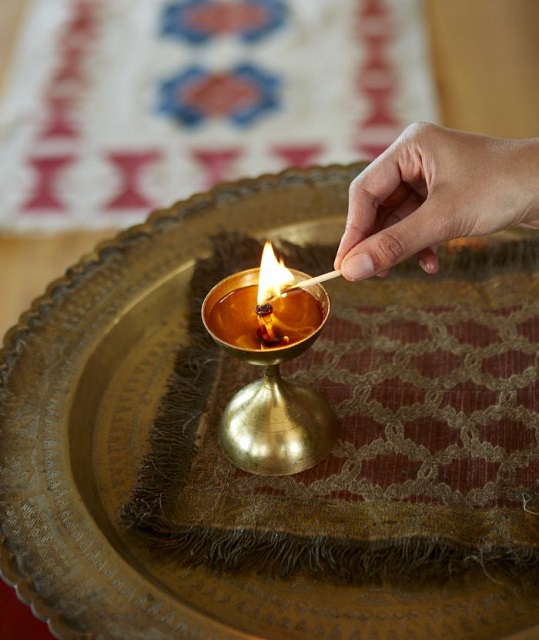
The Vedic sages discovered three qualities (gunas) from their astute observations of the natural world around and within each of us: inertia (tamas), agitation (rajas), and balance (sattva). Once you’re able to see these characteristics within yourself, you will find them in one another and in the world around you.
Tamas, or inertia, is necessary for sleep and rest, but when we have too much of this quality, we can develop the triple Ds we don’t want: darkness, denial, and depression.
On those mornings when you just don’t feel like moving or getting out of bed, that’s excess tamas at work. Too much tamas is like a thick fog that covers the world with a heavy layer of negativity. In nature, it is a cloudy day by a muddy lake, in which everything looks dark, dismal, and polluted.
When we have too much of this quality present, we feel confused about what to do, where to go, and how to be who we really are. We unconsciously create mental traps and subsequent suffering for ourselves. Because it rules the realm of the unconscious mind, when imbalanced, tamas is the force responsible for addictions and criminal activities.
Rajas is associated with action, passion, and motion; it’s the exact opposite of tamas. Whenever you have too much inactivity and inertia in your life, you need the force of rajas to allow you to wake up, get moving, and achieve your goals.
But too much rajas creates excessive movement of thoughts, which can manifest as anxiety, a sharp tongue, and eating too many overly pungent foods that can burn your body. It inspires hatred, lying, cheating, judgmental attitudes, restlessness, and discontent. People with a lot of rajas are like steamrollers, rolling relentlessly over any obstacle in their way. Rajas in nature looks like a turbulent lake, with lots of fast-moving waves, wind, and loud noises. It’s not that fun to be there because there’s too much excitement and commotion. You return from this lake feeling tired.
Rajas can drive you to the point of physical and mental exhaustion, leading to inactivity. This is how rajas and tamas are connected.
Sattva is a balance of healthy rajas and healthy tamas. We are all searching, consciously or unconsciously, for sattva. This quality is connected with clarity, compassion, balance, purity, health, happiness, harmony, and universal love.
Sattva is also another word for the mind in Sanskrit. The spiritual philosophy of yoga and Ayurveda teaches that the nature of even the darkest criminal is sattva—creative, compassionate, and clear. A manifestation of sattva in the natural world is a lake on a picturesque day, when the sun is shining, waves are calm, and everything is so clear that you can see your own reflection in the water. Isn’t it reassuring to know that the true nature of your mind is this beautiful?
Chronic insomnia and many modern diseases stem from stress and negative thinking. The visionary Vedic sages understood how we have to change our behaviors before we can transform our underlying negative mental and emotional states into positive ones.
Just as milk, ghee, turmeric, and other Ayurvedic foods and herbs are physically rejuvenating, your behavior can become a source of mental rejuvenation and transformation. In other words, sattva is something you can cultivate through positive life choices to proactively write your own life script.
Here are three such choices you can cultivate to start changing your mind and changing your life:
1. Clean up your inner and outer space. Keeping your inner and outer space clean means thinking twice about what food you allow into your body and eating more sattvic foods. It also means focusing on positive thoughts instead of negative ones, and keeping your home and work environments clean.
When I start cleaning my home, I often find I’ve accumulated a lot of things; some I need, and many I don’t. The cleaning process can feel endless. There are hidden crevices full of unnecessary items that have built up over time, in the same way hidden emotions can creep into my mind when I’m inattentive.
Though cleaning up my home can feel overwhelming (like letting go of old emotions can seem daunting), I find myself breathing a great sigh of relief at how good it feels to be in a clean space. This same relief comes when I’m able to identify my own negative thinking and emotions through continual observation, gaining knowledge from my teacher, and studying spiritual texts which teach profound ways to gain mastery over your mind.
Keep your surroundings clean by doing a little cleaning around your home or office daily. You can maintain mental cleanliness by following any of these practices. Once your first small step becomes a practice, there’s no looking back.
2. Speak your truth. It’s tempting to slide what’s uncomfortable under the rug. The tendency to deny difficult or painful realities is a sign of tamas and can lead to unhealthy behaviors and emotions. But how do you speak your truth when the other person doesn’t like it?
Along with focusing on process rather than outcome, start by finding a silent place to contemplate and reflect on your core needs—what you are unwilling to compromise. Personal freedom and integrity, for example, are my most prized inner possessions. I don’t compromise them for anyone or anything. By reflecting on the importance of these needs, you build conviction. Conviction builds courage, and courage leads to expression.
Speaking your truth requires courage, as you risk the other person not understanding, or even leaving. But the reward is gaining your character. Those who stay respect your truth and start changing their behavior. Those who can’t face your truth leave. This is for the best, as those with whom you surround yourself profoundly influence your mind.
You want to attract people who resonate with your truth. I was initially scared to tell my parents I was studying Ayurveda, as I didn’t think they would understand or support me. And when I finally did tell them, they didn’t understand at first. But the feeling I had when I spoke my truth was worth it—I felt free.
Don’t confuse speaking your truth with expressing anger. To be the truth, it has to be true in the past, present, and future. You should speak your truth in a pleasant way that benefits you and the other person (even if uncomfortable at first).
And the idea of speaking “your truth” is somewhat of an oxymoron, in the sense that “your truth” is true only insofar as it is ultimately universal truth. To speak universal truth, there should be compassion for yourself and for the one(s) you are speaking to.
3. Light a lamp. Knowledge removes ignorance, just as light removes darkness. The light of the lamp represents knowledge, illumination, auspicious behavior, health, and wealth in Ayurveda. It epitomizes the victory of the light of knowledge over the darkness of our negative thinking, addictions, destructive habits, and excess emotional reactions.
I love lighting lamps for their potent symbolic value. The lamp oil (sesame oil or ghee) represents negative mental tendencies. The wick embodies ego. When the wick gets lit by the flame of Ayurvedic knowledge, negative tendencies slowly become exhausted and the ego also perishes in time. The flame burning upward symbolizes how we acquire knowledge to take us toward positive ideals.
In the Vedic tradition, it’s believed that the light of the lamp bestows blessings of personal power, courage, recognition, discernment, detachment, and abundance. You can ask for these blessings while lighting the lamp. There’s also a beautiful mantra that we traditionally chant when lighting a lamp.
It goes:
“I bow to the light from the lamp, which brings brilliance representing knowledge, auspiciousness, health, wealth, and possessions, and which destroys my negative thoughts (which are enemies of everything previously mentioned).”
You can offer this universal mantra while lighting your lamp if you wish. The most important thing, however, is simply to connect with the light of the lamp, as it represents welcoming the light of knowledge into your heart.
.
**This piece is an excerpt from Ananta’s book, The Ayurveda Way: 108 Practices from the World’s Oldest Healing System for Better Sleep, Less Stress, Optimal Digestion, and More.

 Share on bsky
Share on bsky






Read 2 comments and reply